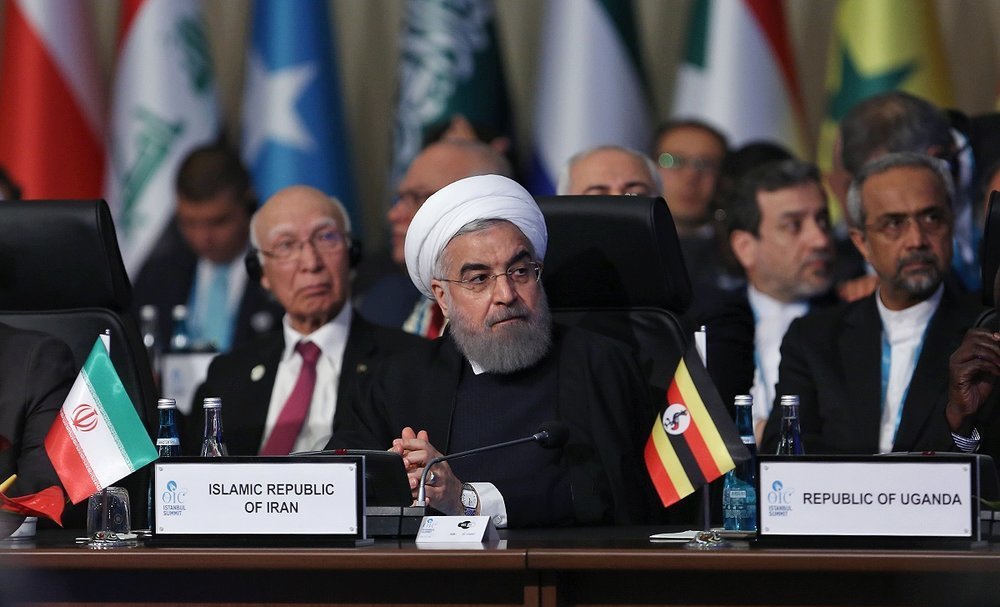Rouhani urges OIC to iron out divisions through dialogue

TEHRAN - President Hassan Rouhani has urged OIC nations to stick to dialogue and diplomacy as solutions to all problems inflicting the Islamic world, IRNA reported.
“Dialogue and interaction are the starting point for understanding woes and contemporary political issues and resolving them,” Rouhani remarked in a speech to the leaders of Islamic nations convening in Istanbul on Thursday.
He said ever since the OIC presidency was handed over to the Islamic Republic of Iran in Tehran to the time it proposed the idea of a “world against violence and extremism (WAVE)” to the UN General Assembly, Iran has been insisting on this pivotal point.
The OIC summit comes at a time that Iraq and Syria have made key gains against Takfiri groups in recent months. Also, reportedly ceasefire is taking hold in Yemen.
Also, Rouhani said, “It is a reality that the decline of the Islamic civilization started as great Islamic powers entered futile conflicts with each other in lieu of synergy, paving the way for foreign invasion.”
"No message which would fuel division in the Islamic community should come out of the conference which bears the name of unity and any divisive moves are certainly invalid as the organization and Islamic nations have no consensus on it and it is antithetical to the philosophy of the organization.”
Elsewhere in his remarks, Rouhani highlighted that Islam has been once more under increasing political, economic, cultural, and ideological, and theological attacks “but in a different way, this time Islam against Islam and religion against religion.”
To depict a better future for the Islamic world, Rouhani drew the attention of leaders of Islamic nations to three key axioms: As the first of these, OIC members need to remain committed to dialogue and diplomatic tools as solution to all conflicts.
“This time Islam (is) against Islam and religion against religion,” Rouhani laments.
Second, Islamic nations should bear in mind that sustainable security and scientific progress of OIC members should be considered the security, progress, and development of the Islamic world. And finally, the Zionist regime must be remembered as the main source of violence and extremism.
Rouhani also stated that Iran has avoided any tension and instability in the region through its transparent regional and international policy, seeking unity and solidarity among Islamic nations, making it a priority “to boost ties with Islamic countries”.
A highlight in Rouhani’s address was Iran’s readiness to iron out differences with other countries through Islamic brotherhood and good neighborliness. “Iran is also ready to clarify ambiguities and differences through consultation and constructive interaction.”
The remarks were a clear reference to Saudi Arabia, which severed all its political ties with Iran after Riyadh’s diplomatic posts in Iran were attacked, a move which was strongly denounced by Iranian officials.
Also, Iran has been at loggerheads with regional countries, including Saudi Arabia and Turkey, over the future of the Syrian government.
Quite relevant to this, President Rouhani hinted at political severance between Tehran and Riyadh, saying, “It is clear that neither Iran is Saudi Arabia’s problem nor is Saudi Arabia Iran’s. Rather the main problem is ignorance, bias, and aggression.”
This is not the first time Iran is offering a cessation of hostilities among neighboring countries to restore peace and instability in the region.
“Islamic Republic of Iran has always been a supporter of Islamic countries and Muslims against invasion, threat, occupation and terrorism and continues to be so.”
Iran was the first country to condemn Saddam Hossein’s invasion of Kuwait and provided secure shelter for Kuwaitis and Iraqis and rushed to help the Iraqi government and nation when the country was attacked by Takfiri groups, the president added.
While all participating leaders in the summit were unanimous in their calling for unity and solidarity among Islamic nations, there were moves in the gathering questioning this.
The most important of this was the inclusion of four anti-Iran and -Hezbollah articles in the final declaration of the summit.
As a sign of objection, President Rouhani and Foreign Affairs Minister Mohammad Javad Zarif refused to attend the final episode of the gathering.
AK/PA
Leave a Comment